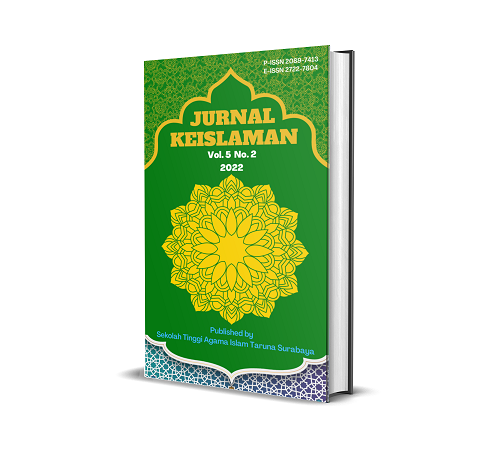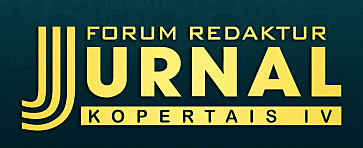PENGGUNAAN METODE SOROGAN DALAM MENINGKATKAN KUALITAS BACAAN AL-QUR’AN
Abstract
This research is motivated by the importance of improving the quality of reading the Qur'an to students, as a step to anticipate the decline of the Qur'anic generation that is currently happening. Islamic boarding schools apply the use of the sorogan method in Islamic boarding schools, designed to form Qur'anic people who believe in the truth of the contents of the Qur'an, read, memorize, and understand the meaning contained properly and correctly. This requires to form individuals who are proficient in reading the Qur'an in accordance with the science of tajwid, makhorijul letters, shifatul letters and try to produce tartil reading quality. The use of the sorogan method is unique and different from the others, so that triggers are interested in research. The purpose of the study was to examine how the use of the sorogan method in improving the quality of reading the Qur'an at the Al-Istiqomah Tanjungsiang Islamic boarding school. This research was conducted with a descriptive qualitative research method with a case approach. The research subjects used were the leadership of the Islamic boarding school, the community council (teacher) of the students of the Al-Istiqomah Tanjungsiang Islamic boarding school. The instruments used are interviews and observations. Meanwhile, data reduction, data presentation, and data verification were used as steps to analyze the data. The results of this study, namely the use of the sorogan method in improving the quality of reading the Qur'an at the Al-Istiqomah Tanjungsiang Islamic boarding school applied, namely (a). get used to using the sorogan method in improving the quality of reading the Qur'an as it is done at dawn, ba'da magrib and taqroruddurus time (b). knowing the advantages of the sorogan method, seen by looking at the results of using the sorogan method then students practicing and developing it (c). before using the sorogan method, it was rather difficult for students to read the Qur'an (d). get used to discipline by coming to the Koran not too late (e) getting used to using the sorogan method, namely reading Al-Fatihah letters together, reading prayers, students facing the ustadz one by one, and finally closing prayers together. same. As for the use of the sorogan method, it can improve the quality of reading the Qur'an, as there are some students who win in the field of tahfidz and qiro'at.References
Abd. Wadud. 2014. "Pendidikan Agama Islam Al-Quran Hadis Kelas VII." Semarang.
Abduk Hamid. 2016. "Pengantar Studi Al-Quran." Jakarta.
Abdul, Mukti, Bisri dkk. 2002. "Pengembangan Metodologi Pembelajaran Di Salafiyyah." Departemen Agama.
Abdurrahman Ar-Rumi, Fahd. 1996. "Ulumul Quran: Studi Kompleksitas Al-Quran." Yogyakarta.
Ahmad Sarwat. 2020. "Sejarah Al-Quran." Jakarta.
Ahmad Zayadi, Amal fathullah dll. 2020. "Buku Putih Pesantren Muadalah." Jakarta.
Albi Anggito, Johan Setiawan. 2018. "Metodologi Penelitian Kualitatif." Sukabumi.
AlFauziyah, Inayah. 2010. Pengaruh Penerapan Metode Sorogan Terhadap Kemampuan Membaca Al-Quran
Anak Usia 6-7 Tahun Di Pondok Tahfidz Yanbuul Quran Anak-Anak Kudus.
Ali ZAenal Abidin Al-Habsy. 2020. "Rahasia Nama & Sifat Al-QUran." Jakarta Timur.
Amin Haedari. 2004. "Masa Depan Pesantren Dalam Tantangan Modernitas Dan Tantangan Kompleksitas Global." Jakarta.
Amroeni Drajat. 2017. "Ulumul Quran Pengantar Ilmu-Ilmu Al-Quran." Jakarta.
Arief, Armai. n.d. "Pengantar Ilmu Dan Metodologi Pendidikan Islam." 2002nd ed. Jakarta.
Churmain, Muhamad. 2017. Peningkatan Kualitas Membaca Al-Quran Secara Tartil Dengan Metode QiroAti Pada Siswa Kelas X Tkr 1 Smk MaArif Tegalrejo Kabupaten Magelang Tahun Pelajaran 2016/2017.
Departemen Agama. 2003. "Pola Pembelajaran Di Pesantren." Jakarta.
Departemen Agama. 2016. Al-Quran Cordoba (Al-Quran Dan Terjemahannya). Bandung.
Didik Sulaeman. 2015. Pengaruh Metode Sorogan Terhadap Kemampuan Mambaca Al-Quran Pada Santri Kelas idady Pondok Pesantren Al-Luqmaniyyah Yogyakarta.
Dkk, Zuhairini. n.d. "Metodik Khusus Pendidikan Islam." Malang.
H. Abuddin Nata. 2016. "Pendidikan Dalam Persefektif Al-Quran." Jakarta.
Hasbullah. 1996. "Sejarah Pendidikan Islam Di Indonesia." Jakarta.
Ibnu Kastir. 1999. "Tafsir Al-Quran Al-Adzim." Beirut.
Imam Banawi. 1993. "Tradisional Dalam Pendidikan Islam." Surabaya.
Iskandarwasid, Dadang Suhendar. 2011. "Strategi Pembelajaran Bahasa." Bandung.
Jazari, Muhammad. 1377. "Matan Jazariyah."
Kementrian Agama RI. n.d. "Buku Siswa Al-Quran Hadis." Jakarta.
M.Quraish Shihab. 2007. "Wawasan Al-Quran Tafsir Tematik Atas Pelbagia Persoalan Umat." Jakarta.
Mamik. 2015. "Metode Kualitatif." Sidarjo.
Manna Al-Qathan. 2004. "Ilmu Al-Quran." Jakarta.
Manna AL-Qattan. 2000. "Mabahits Fi Ulum Al-Quran." Bandung.
Mastuhu. 1994. "Dinamika Sistem Pendidikan Pesantren: Suatu Kajian Tentang Unsur Dan Nilai Sistem Pendidikan Pesantren." Jakarta.
Meleong, Lexy J. 2000. "Metodologi Penelitian Kualitatif." PT. Remaja. Bandung.
Moch Zaiful Rasyid, Mustajab, dll. 2020. "Pesantren Dan Pengelolaannya." Bandung.
Muhammad fahd, Ats-Tsuwaini. 2009. "10 Metode Efektif Agar Anak Mencintai Al-Quran." Al-Ajda. Yogyakarta.
Muhammad Rasyid Ridha. 1990. "Tafsir Al-Manar." Mesir.
Muri Yusuf. 2017. "Metode Penelitian Kuantitaif, Kualitatif & Penelitian Gabungan." Jakarta.
Nata, Abuddin. 2001. "Sejarah Pertumbuhan Dan Perkembangan Lembaga-Lembaga Pendidikan Islam Di Indonesia." Jakarta.
Nazir, Mohammad. 1988. "Metode Penelitian." Jakarta.
Nur, Iys, and Handayani Suismanto. 2018. Metode Sorogan Dalam Meningkatkan Kemampuan Membaca Alquran Pada Anak Iys Nur Handayani, Suismanto Metode Sorogan Dalam Meningkatkan Kemampuan Membaca Alquran
Pada Anak. Age Jurnal Ilmiah Tumbuh Kembang Anak Usia Dini 3(2):10314.
Nurlia, Rahmi D. W. I. 2018. Efektivitas Metode Sorogan Dalam Pembelajaran Qowa Id Di Pondok Pesantren Putri
Al-Hidayah Kroya. 140.
Pratiwi, Tri Oktiana Endah. 2013. Model Pembelajaran Al-Quran Untuk Meningkatkan Kualitas Bacaan Siswa (Studi Kasus Di SMK Muhammadiyah Kartasura). Naskah Skripsi 122.
Qomar, Mujamil. 2005. Dari Transformasi Metodolgi Menuju Demokratisasi Institusi. Jakarta.
Rio Anjasmara. 2020. Fungsi Al-Quran Di Sekolah. Angewandte Chemie International Edition, 6(11), 951952.
Rofi, Sofyan. 2016. "Sejarah Pendidikan Islam Di Indonesia." 3rd ed. Yogyakarta.
Rosihon, Anwar. 2012. "Ulum Al-Quran." Bandung.
Said Aqiel Siradj. 1999. "Pesantren Masa Depan." Bandung.
Saefulloh, Ujang. 2013. "Manajemen Pendidikan Islam." Bandung.
Samsul Nizar. 2002. "Filsafat Pendidikan Islam: Pendekatan Historis, Teoritis Dan Praktis." Jakarta.
Samsul Nizar. 2013. "Sejarah Sosial Dan Dinamika Intelektual Pendidikan Islam Di Nusantara." Jakarta.
Sehat Sultoni Dalimunthe. 2020. "Sejarah Pendidikan Pesantren Di Kabupaten Padang Lawas Utara. edited by A. Y. Dalimunthe". Yogyakarta.
Soekartawi dkk. 1995. "Meningkatkan Rancangan Intruksional (Intruksional Design) Untuk Memperbaiki Kualitas Belajar Mengajar. PT. RajaGr."Jakarta.
Sugiono. 2013. "Metode Penelitian Pendidikan Kualitatif Dan Kuantitaif." Bandung.
Uharsputra. 2007. Proses Pembelajaran Di Pesantren. Http:Uharsputra.Worldpress,Com/,.
Wina Sanjaya. 2006. "Pembelajaran Dalam Implementasi Kurikulum Berbasis Kompetensi." Jakarta.
Yusran, Asmuni. 2001. "Pengantar Studi Al-Quran, Al-Hadist, Fiqh, Dan Pranata Sosial." Jakarta.
Yusuf, Qaradhawi. 2000. "Bagaimana Berinteraksi Dengan Al-Quran." Jakarta.
Zain, Syaiful Bahri dzamarah &. Aswan. 2010. "Strategi Belajar Mangajar." Jakarta.
Zuhairi Misrawi. 2010. "Al-Quran Kitab Toleransi." Jakarta.
Copyright (c) 2022 Afif Nurseha

This work is licensed under a Creative Commons Attribution-ShareAlike 4.0 International License.
Authors who publish with this journal agree to the following terms:
- Authors retain copyright and grant the journal right of first publication with the work simultaneously licensed under a Creative Commons Attribution-ShareAlike that allows others to share the work with an acknowledgement of the work's authorship and initial publication in this journal.
- Authors are able to enter into separate, additional contractual arrangements for the non-exclusive distribution of the journal's published version of the work (e.g., post it to an institutional repository or publish it in a book), with an acknowledgement of its initial publication in this journal.
- Authors are permitted and encouraged to post their work online (e.g., in institutional repositories or on their website) prior to and during the submission process, as it can lead to productive exchanges, as well as earlier and greater citation of published work (See The Effect of Open Access).






















